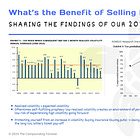Spiking VIX
In last week’s digest, we discussed the spike in volatility (VIX) reaching 29.6%. With such a dramatic increase in volatility, many stocks tend to be sold off. If volatility decreases slightly but remains high, some stocks may recover part or all of their losses, leading to a rotation in the market.
To be clear, we are not market timers, nor do we have a crystal ball, and we do not implement short-term trading strategies. However, when fear is high and remains elevated, the investment case for "Compounding Tortoises" becomes very enticing. Each period of volatility is triggered by different factors, yet often leads to similar outcomes.
VIX
This perspective is not just from a financial analysis standpoint but also from a behavioral one. Steady compounders are often overlooked and thus less crowded than high-beta stocks. These stocks are easier to hold onto during volatile times and offer investors a steadier dollar-cost averaging trajectory.
We have significant empirical evidence to support this, and we have conducted two webinars and written an article on the topic. While volatility is often seen as a positive because it presents more opportunities, very few investors can handle the heat. As we like to say: be careful what you wish for.
And one of the primary goals of this Substack is to help investors stay the course during tough times. A rising tide lifts all boats, but what happens if you face some significant two-sided action (that can last for several years), a prolonged bear market in cyclical growth stocks?
Bloomberg cites that traders expect a 60% chance of a so-called inter-meeting interest rate cut by the FED, of roughly 50 bps. Unemployment is still at just 4.3% and inflation isn’t at 2%. It wouldn’t be a good sign for the overall economy and the Fed’s credibility.
We think that the unwinding of excessive borrowing via the Japanese Yen used for momentum-driven equity strategies is the driver behind today’s volatility. We just didn’t think it could be this huge. Just like the previous run-up in momentum stocks, that’s happened since the beginning of 2023, wasn’t justified.
So, what will we do next?







